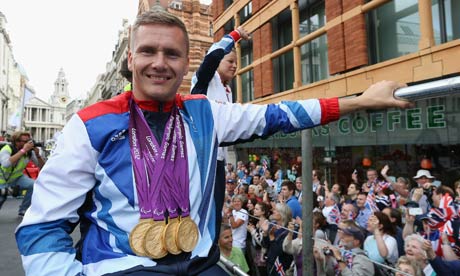Aboriginal Paralympic Champion and SCI BC Peer Mentor Gives Back On and Off the Court
By Maya Pankalla
“You can complain about anything every single day of your life, or you can get out there and live your life.”
 An excited four year old. A schoolbus. A blind spot.
An excited four year old. A schoolbus. A blind spot.
Richard Peter doesn’t remember his accident, but he’s read the court cases and shared his experience with rooms of schoolkids so many times that he more or less has the details down.
“I wanted to go play and have fun with all my friends, so I tried to run and catch up to the school bus. But the bus driver didn’t see me behind him, and he backed up right over me,” says Richard, 41, who grew up in a Cowichan reserve near the island town of Duncan. “The only reason I lived was that I fell into a puddle—he ran right over my chest.”
As with any spinal cord injury, the injury didn’t just happen to Richard—it happened to his whole community. And, if the accident itself doesn’t stick out in Richard’s mind, the support he received afterwards does. Workers from Spinal Cord Injury BC (formerly the BC Paraplegic Association) visited the small boy in rehabilitation and later at his Duncan home, and helped his parents adapt to caring for a child in a wheelchair.
“A spinal cord injury doesn’t happen to one person—it happens to their whole community.”
His siblings, cousins, and friends continued to challenge Richard in a variety of sports. And, slowly, the small town of Duncan adjusted too, taking note of how inaccessible most public buildings were and even arranging for a wheelchair basketball demo team to play at Richard’s high school.
“A BCPA [ Spinal Cord Injury BC] worker got me one of my first sports chairs,” Richard says. “The first time I played wheelchair basketball, I didn’t even know that there was a Paralympics—I just enjoyed playing sports.”
When, as a teenager, he did finally try his hand at wheelchair sports, Richard, who was used to keeping up with his able-bodied cousins and friends, excelled. He drifted towards team sports, zeroed in on basketball, and soon found himself on the provincial, and then the national, team. “I liked participating in sports and travelling, and the big thing was that I was able to travel off of the island,” says Richard who, on the court, picked up the nickname Bear. “Once I made the provincial team and national team, I started travelling all over the world.”
Read the full article at Spinal Cord Injury BC
http://sci-bc.ca/peer-profiles/richard-peter/







